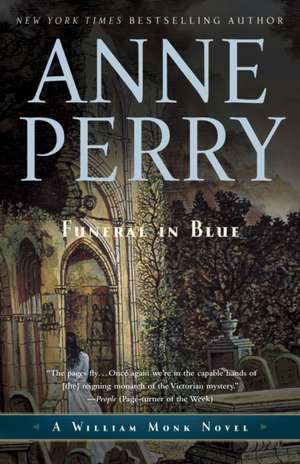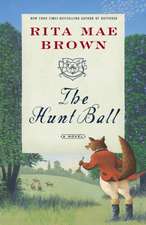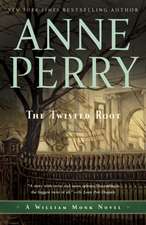Funeral in Blue
Autor Anne Perryen Limba Engleză Paperback – 28 feb 2011
Preț: 107.27 lei
Nou
Puncte Express: 161
Preț estimativ în valută:
20.53€ • 21.43$ • 16.99£
20.53€ • 21.43$ • 16.99£
Carte disponibilă
Livrare economică 14-28 martie
Preluare comenzi: 021 569.72.76
Specificații
ISBN-13: 9780345514141
ISBN-10: 0345514149
Pagini: 352
Dimensiuni: 132 x 202 x 19 mm
Greutate: 0.25 kg
Editura: BALLANTINE BOOKS
ISBN-10: 0345514149
Pagini: 352
Dimensiuni: 132 x 202 x 19 mm
Greutate: 0.25 kg
Editura: BALLANTINE BOOKS
Notă biografică
Among Anne Perry’s other novels featuring investigator William Monk are Slaves of Obsession, The Twisted Root, A Breach of Promise, and The Silent Cry. She also writes the popular novels featuring Thomas and Charlotte Pitt, including The Whitechapel Conspiracy, Half Moon Street, Bedford Square, and Brunswick Gardens. Anne Perry lives in Scotland.
From the Hardcover edition.
From the Hardcover edition.
Extras
The operating room was silent except for the deep, regular breathing of the gaunt young woman who lay on the table, the immense bulge of her stomach laid bare.
Hester stared across at Kristian Beck. It was the first operation of the day, and there was no blood on his white shirt yet. The chloroform sponge had done its miraculous work and was set aside. Kristian picked up the scalpel and touched the point to the young woman’s flesh. She did not flinch; her eyelids did not move. He pressed deeper, and a thin, red line appeared.
Hester looked up and met his eyes, dark, luminous with intelligence. They both knew the risk, even with anesthesia, that they could do little to help. A growth this size was probably fatal, but without surgery the woman would die anyway.
Kristian lowered his eyes and continued cutting. The blood spread. Hester swabbed it up. The woman lay motionless except for her breathing, her face waxen pale, cheeks sunken, shadows around the sockets of her eyes. Her wrists were so thin the shape of the bones poked through the skin. It was Hester who had walked beside her from the ward along the corridor, half supporting her weight, trying to ease the anxiety which had seemed to torment her every time she had been to the hospital over the last two months. Her pain seemed as much in her mind as in her body.
Kristian had insisted on surgery, against the wishes of Fermin Thorpe, the chairman of the Hospital Governors. Thorpe was a cautious man who enjoyed authority, but he had no courage to step outside the known order of things he could defend if anyone in power were to question him. He loved rules; they were safe. If you followed the rules you could justify anything.
Kristian was from Bohemia, and in Thorpe’s mind he did not belong in the Hampstead Hospital in London with his imaginative ways and his foreign accent, however slight, and his disregard for the way things should be done. He should not risk the hospital’s reputation by performing an operation whose chances of success were so slight. But Kristian had an answer, an argument, for everything. And, of course, Lady Callandra Daviot had taken his side; she always did.
Kristian smiled at the memory, not looking up at Hester but down at his hands as they explored the wound he had made, looking for the thing that had caused the obstruction, the wasting, the nausea and the huge swelling.
Hester mopped away more blood and glanced at the woman’s face. It was still perfectly calm. Hester would have given anything she could think of to have had chloroform on the battlefield in the Crimea five years ago, or even at Manassas, in America, three months back.
“Ah!” Kristian let out a grunt of satisfaction and pulled back, gently easing out of the cavity something that looked like a dark, semiporous sponge such as one might use to scrub one’s back, or even a saucepan. It was about the size of a large domestic cat.
Hester was too astounded to speak. She stared at it, then at Kristian.
“Trichobezoar,” he said softly. Then he met her gaze of incredulity. “Hair,” he explained. “Sometimes when people have certain temperamental disorders, nervous anxiety and depression, they feel compelled to pull out their own hair and eat it. It is beyond their power to stop, without help.”
Hester stared at the stiff, repellent mass lying in the dish and felt her own throat contract and her stomach gag at the thought of such a thing inside anyone.
“Swab,” Kristian directed. “Needle.”
“Oh!” She moved to obey just as the door opened and Callandra came in, closing it softly behind her. She looked at Kristian first, a softness in her eyes she disguised only as he turned to her. He gestured to the dish and smiled.
Callandra looked startled, then she turned to Hester. “What is it?”
“Hair,” Hester replied, swabbing the blood away again as Kristian worked.
“Will she be all right?” Callandra asked.
“There’s a chance,” Kristian answered. Suddenly he smiled, extraordinarily sweetly, but there was a sharp and profound satisfaction in his eyes. “You can go and tell Thorpe it was a trichobezoar, not a tumor, if you like.”
“Oh, yes, I’d like,” she answered, her face melting into something almost like laughter, and without waiting she turned and went off on the errand.
Hester glanced across at Kristian, then bent to the work again, mopping blood and keeping the wound clean, as the needle pierced the skin and drew the sides together, and finally it was bandaged.
“She’ll feel a great deal of pain when she wakens,” Kristian warned. “She mustn’t move too much.”
“I’ll stay with her,” Hester promised. “Laudanum?”
“Yes, but only for the first day,” he warned. “I’ll be here if you need me. Are you going to stay? You’ve watched her all through, haven’t you?”
“Yes.” Hester was not a nurse at the hospital. She came on a voluntary basis, like Callandra, who was a military surgeon’s widow, a generation older than Hester, but they had been the closest of friends now for five years. Hester was probably the only one who knew how deeply Callandra loved Kristian, and that only this week she had finally declined an offer of marriage from a dear friend because she could not settle for honorable companionship and close forever the door on dreams of immeasurably more. But they were only dreams. Kristian was married, and that ended all possibility of anything more than the loyalty and the passion for healing and justice that held them now, and perhaps the shared laughter now and then, the small victories and the understanding.
Hester, recently married herself, and knowing the depth and the sweep of love, ached for Callandra that she sacrificed so much. And yet loving her husband as she did, for all his faults and vulnera- bilities, Hester, too, would rather have been alone than accept anyone else.
It was late afternoon when Hester left the hospital and took the public omnibus down Hampstead High Street to Haverstock Hill, and then to Euston Road. A newsboy shouted something about five hundred American soldiers surrendering in New Mexico. The papers carried the latest word on the Civil War, but the anxiety was far deeper over the looming cotton famine in Lancashire because of the blockading of the Confederate States.
She hurried past him and walked the last few yards to Fitzray Street. It was early September and still mild, but growing dark, and the lamplighter was well on his rounds. When she approached her front door she saw a tall, slender man waiting impatiently outside. He was immaculately dressed in high wing collar, black frock coat and striped trousers, as one would expect of a City gentleman, but his whole attitude betrayed agitation and deep unhappiness. It was not until he heard her footsteps and turned so the lamplight caught his face that she recognized her brother, Charles Latterly.
“Hester!” He moved towards her swiftly, then stopped. “How . . . how are you?”
“I’m very well,” she answered truthfully. It was several months since she had seen him, and for someone as rigidly controlled and conventional as Charles, it was extraordinary to find him waiting in the street like this. Presumably, Monk was not there yet or he would have gone inside.
She opened the door and Charles followed her in. The gas lamp burned very low in the hall, and she turned it up and led the way to the front room, which was where Monk received prospective clients who came with their terrors and anxieties for him to attempt to solve. Since they had both been out all day, there was a fire laid but not lit. A bowl of tawny chrysanthemums and scarlet nasturtiums gave some light and an illusion of warmth.
She turned and looked at Charles. As always, he was meticulously polite. “I’m sorry to intrude. You must be tired. I suppose you have been nursing someone all day?”
“Yes, but I think she may get better. At least, the operation was a success.”
He made an attempt at a smile. “Good.”
“Would you like a cup of tea?” she offered. “I would.”
“Oh . . . yes, yes, of course. Thank you.” He sat gingerly on one of the two armchairs, his back stiff and upright as if to relax were impossible. She had seen so many of Monk’s clients sit like that, terrified of putting their fears into words, and yet so burdened by them and so desperate for help that they had finally found the courage to seek a private agent of enquiry. It was as if Charles had come to see Monk, and not her. His face was pale and there was a sheen of sweat on it, and his hands were rigid in his lap. If she had touched him she would have felt locked muscles.
She had not seen him look so wretched since their parents had died five and a half years ago, when she was still in Scutari with Flor- ence Nightingale. Their father had been ruined by a financial swindle, and had taken his own life because of the ensuing disgrace. Their mother had died within the month. Her heart had been weak, and the grief and distress so soon after the loss of her younger son in battle had been too much for her.
Looking at Charles now, Hester’s similar fears for him returned with a force that took her by surprise. They had seen each other very little since Hester’s marriage, which Charles had found difficult to approve—after all, Monk was a man without a past. A carriage accident six years ago had robbed him of his memory. Monk had deduced much about his past, but the vast majority of it remained unknown. Monk had been in the police force at the time of his meeting with Hester, and no one in the very respectable Latterly family had had any prior connections with the police. Beyond question, no one had married into that type of social background.
Charles looked up, expecting her to fetch the tea. Should she ask him what troubled him so profoundly, or would it be tactless, and perhaps put him off confiding in her?
“Of course,” she said briskly, and went to the small kitchen to riddle the stove, loosen the old ashes and put more coal on to boil the kettle. She set out biscuits on a plate. They were bought, not homemade. She was a superb nurse, a passionate but unsuccessful social reformer, and as even Monk would admit, a pretty good detective, but her domestic skills were still in the making.
When the tea was made she returned and set the tray down, poured both cups and waited while he took one and sipped from it. His embarrassment seemed to fill the air and made her feel awkward as well. She watched him fidget with the cup and gaze around the small, pleasant room, looking for something to pretend to be interested in.
If she was blunt and asked him outright, would she make it better or worse? “Charles . . .” she began.
He turned to look at her. “Yes?”
She saw a profound unhappiness in his eyes. He was only a few years older than she, and yet there was a weariness in him, as if he no longer had any vitality and already felt himself past the best. It touched her with fear. She must be gentle. He was too complex, far too private for bluntness.
“It’s . . . it’s rather a long time since I’ve seen you,” he began apologetically. “I didn’t realize. The weeks seem to . . .” He looked away, fishing for words and losing them.
From the Hardcover edition.
Hester stared across at Kristian Beck. It was the first operation of the day, and there was no blood on his white shirt yet. The chloroform sponge had done its miraculous work and was set aside. Kristian picked up the scalpel and touched the point to the young woman’s flesh. She did not flinch; her eyelids did not move. He pressed deeper, and a thin, red line appeared.
Hester looked up and met his eyes, dark, luminous with intelligence. They both knew the risk, even with anesthesia, that they could do little to help. A growth this size was probably fatal, but without surgery the woman would die anyway.
Kristian lowered his eyes and continued cutting. The blood spread. Hester swabbed it up. The woman lay motionless except for her breathing, her face waxen pale, cheeks sunken, shadows around the sockets of her eyes. Her wrists were so thin the shape of the bones poked through the skin. It was Hester who had walked beside her from the ward along the corridor, half supporting her weight, trying to ease the anxiety which had seemed to torment her every time she had been to the hospital over the last two months. Her pain seemed as much in her mind as in her body.
Kristian had insisted on surgery, against the wishes of Fermin Thorpe, the chairman of the Hospital Governors. Thorpe was a cautious man who enjoyed authority, but he had no courage to step outside the known order of things he could defend if anyone in power were to question him. He loved rules; they were safe. If you followed the rules you could justify anything.
Kristian was from Bohemia, and in Thorpe’s mind he did not belong in the Hampstead Hospital in London with his imaginative ways and his foreign accent, however slight, and his disregard for the way things should be done. He should not risk the hospital’s reputation by performing an operation whose chances of success were so slight. But Kristian had an answer, an argument, for everything. And, of course, Lady Callandra Daviot had taken his side; she always did.
Kristian smiled at the memory, not looking up at Hester but down at his hands as they explored the wound he had made, looking for the thing that had caused the obstruction, the wasting, the nausea and the huge swelling.
Hester mopped away more blood and glanced at the woman’s face. It was still perfectly calm. Hester would have given anything she could think of to have had chloroform on the battlefield in the Crimea five years ago, or even at Manassas, in America, three months back.
“Ah!” Kristian let out a grunt of satisfaction and pulled back, gently easing out of the cavity something that looked like a dark, semiporous sponge such as one might use to scrub one’s back, or even a saucepan. It was about the size of a large domestic cat.
Hester was too astounded to speak. She stared at it, then at Kristian.
“Trichobezoar,” he said softly. Then he met her gaze of incredulity. “Hair,” he explained. “Sometimes when people have certain temperamental disorders, nervous anxiety and depression, they feel compelled to pull out their own hair and eat it. It is beyond their power to stop, without help.”
Hester stared at the stiff, repellent mass lying in the dish and felt her own throat contract and her stomach gag at the thought of such a thing inside anyone.
“Swab,” Kristian directed. “Needle.”
“Oh!” She moved to obey just as the door opened and Callandra came in, closing it softly behind her. She looked at Kristian first, a softness in her eyes she disguised only as he turned to her. He gestured to the dish and smiled.
Callandra looked startled, then she turned to Hester. “What is it?”
“Hair,” Hester replied, swabbing the blood away again as Kristian worked.
“Will she be all right?” Callandra asked.
“There’s a chance,” Kristian answered. Suddenly he smiled, extraordinarily sweetly, but there was a sharp and profound satisfaction in his eyes. “You can go and tell Thorpe it was a trichobezoar, not a tumor, if you like.”
“Oh, yes, I’d like,” she answered, her face melting into something almost like laughter, and without waiting she turned and went off on the errand.
Hester glanced across at Kristian, then bent to the work again, mopping blood and keeping the wound clean, as the needle pierced the skin and drew the sides together, and finally it was bandaged.
“She’ll feel a great deal of pain when she wakens,” Kristian warned. “She mustn’t move too much.”
“I’ll stay with her,” Hester promised. “Laudanum?”
“Yes, but only for the first day,” he warned. “I’ll be here if you need me. Are you going to stay? You’ve watched her all through, haven’t you?”
“Yes.” Hester was not a nurse at the hospital. She came on a voluntary basis, like Callandra, who was a military surgeon’s widow, a generation older than Hester, but they had been the closest of friends now for five years. Hester was probably the only one who knew how deeply Callandra loved Kristian, and that only this week she had finally declined an offer of marriage from a dear friend because she could not settle for honorable companionship and close forever the door on dreams of immeasurably more. But they were only dreams. Kristian was married, and that ended all possibility of anything more than the loyalty and the passion for healing and justice that held them now, and perhaps the shared laughter now and then, the small victories and the understanding.
Hester, recently married herself, and knowing the depth and the sweep of love, ached for Callandra that she sacrificed so much. And yet loving her husband as she did, for all his faults and vulnera- bilities, Hester, too, would rather have been alone than accept anyone else.
It was late afternoon when Hester left the hospital and took the public omnibus down Hampstead High Street to Haverstock Hill, and then to Euston Road. A newsboy shouted something about five hundred American soldiers surrendering in New Mexico. The papers carried the latest word on the Civil War, but the anxiety was far deeper over the looming cotton famine in Lancashire because of the blockading of the Confederate States.
She hurried past him and walked the last few yards to Fitzray Street. It was early September and still mild, but growing dark, and the lamplighter was well on his rounds. When she approached her front door she saw a tall, slender man waiting impatiently outside. He was immaculately dressed in high wing collar, black frock coat and striped trousers, as one would expect of a City gentleman, but his whole attitude betrayed agitation and deep unhappiness. It was not until he heard her footsteps and turned so the lamplight caught his face that she recognized her brother, Charles Latterly.
“Hester!” He moved towards her swiftly, then stopped. “How . . . how are you?”
“I’m very well,” she answered truthfully. It was several months since she had seen him, and for someone as rigidly controlled and conventional as Charles, it was extraordinary to find him waiting in the street like this. Presumably, Monk was not there yet or he would have gone inside.
She opened the door and Charles followed her in. The gas lamp burned very low in the hall, and she turned it up and led the way to the front room, which was where Monk received prospective clients who came with their terrors and anxieties for him to attempt to solve. Since they had both been out all day, there was a fire laid but not lit. A bowl of tawny chrysanthemums and scarlet nasturtiums gave some light and an illusion of warmth.
She turned and looked at Charles. As always, he was meticulously polite. “I’m sorry to intrude. You must be tired. I suppose you have been nursing someone all day?”
“Yes, but I think she may get better. At least, the operation was a success.”
He made an attempt at a smile. “Good.”
“Would you like a cup of tea?” she offered. “I would.”
“Oh . . . yes, yes, of course. Thank you.” He sat gingerly on one of the two armchairs, his back stiff and upright as if to relax were impossible. She had seen so many of Monk’s clients sit like that, terrified of putting their fears into words, and yet so burdened by them and so desperate for help that they had finally found the courage to seek a private agent of enquiry. It was as if Charles had come to see Monk, and not her. His face was pale and there was a sheen of sweat on it, and his hands were rigid in his lap. If she had touched him she would have felt locked muscles.
She had not seen him look so wretched since their parents had died five and a half years ago, when she was still in Scutari with Flor- ence Nightingale. Their father had been ruined by a financial swindle, and had taken his own life because of the ensuing disgrace. Their mother had died within the month. Her heart had been weak, and the grief and distress so soon after the loss of her younger son in battle had been too much for her.
Looking at Charles now, Hester’s similar fears for him returned with a force that took her by surprise. They had seen each other very little since Hester’s marriage, which Charles had found difficult to approve—after all, Monk was a man without a past. A carriage accident six years ago had robbed him of his memory. Monk had deduced much about his past, but the vast majority of it remained unknown. Monk had been in the police force at the time of his meeting with Hester, and no one in the very respectable Latterly family had had any prior connections with the police. Beyond question, no one had married into that type of social background.
Charles looked up, expecting her to fetch the tea. Should she ask him what troubled him so profoundly, or would it be tactless, and perhaps put him off confiding in her?
“Of course,” she said briskly, and went to the small kitchen to riddle the stove, loosen the old ashes and put more coal on to boil the kettle. She set out biscuits on a plate. They were bought, not homemade. She was a superb nurse, a passionate but unsuccessful social reformer, and as even Monk would admit, a pretty good detective, but her domestic skills were still in the making.
When the tea was made she returned and set the tray down, poured both cups and waited while he took one and sipped from it. His embarrassment seemed to fill the air and made her feel awkward as well. She watched him fidget with the cup and gaze around the small, pleasant room, looking for something to pretend to be interested in.
If she was blunt and asked him outright, would she make it better or worse? “Charles . . .” she began.
He turned to look at her. “Yes?”
She saw a profound unhappiness in his eyes. He was only a few years older than she, and yet there was a weariness in him, as if he no longer had any vitality and already felt himself past the best. It touched her with fear. She must be gentle. He was too complex, far too private for bluntness.
“It’s . . . it’s rather a long time since I’ve seen you,” he began apologetically. “I didn’t realize. The weeks seem to . . .” He looked away, fishing for words and losing them.
From the Hardcover edition.
Recenzii
“The pages fly . . . Once again we’re in the capable hands of [the] reigning monarch of the Victorian mystery.”—People (Page-turner of the Week)
“Funeral in Blue captures and retains the reader’s undivided attention. . . . The plot is intriguing on its own, but it becomes fascinating as Perry, with each new avenue of the investigation, seamlessly explores the nature of truth and the price at which it comes.”—The Virginian Pilot
“Perry’s historical mysteries suggestively peel away layer after layer of Victorian respectability until the underlying social evils of a gilded era are exposed in all their naked truth.”—The New York Times Book Review
“An old-style private eye novel—and an extremely good one . . . No one writes more elegantly than Perry, nor better conjures up the rich and colorful tapestry of London in the Victorian era.”—The Plain Dealer
“Highly recommended . . . another gripping Victorian spellbinder.”—Library Journal
“Funeral in Blue captures and retains the reader’s undivided attention. . . . The plot is intriguing on its own, but it becomes fascinating as Perry, with each new avenue of the investigation, seamlessly explores the nature of truth and the price at which it comes.”—The Virginian Pilot
“Perry’s historical mysteries suggestively peel away layer after layer of Victorian respectability until the underlying social evils of a gilded era are exposed in all their naked truth.”—The New York Times Book Review
“An old-style private eye novel—and an extremely good one . . . No one writes more elegantly than Perry, nor better conjures up the rich and colorful tapestry of London in the Victorian era.”—The Plain Dealer
“Highly recommended . . . another gripping Victorian spellbinder.”—Library Journal









